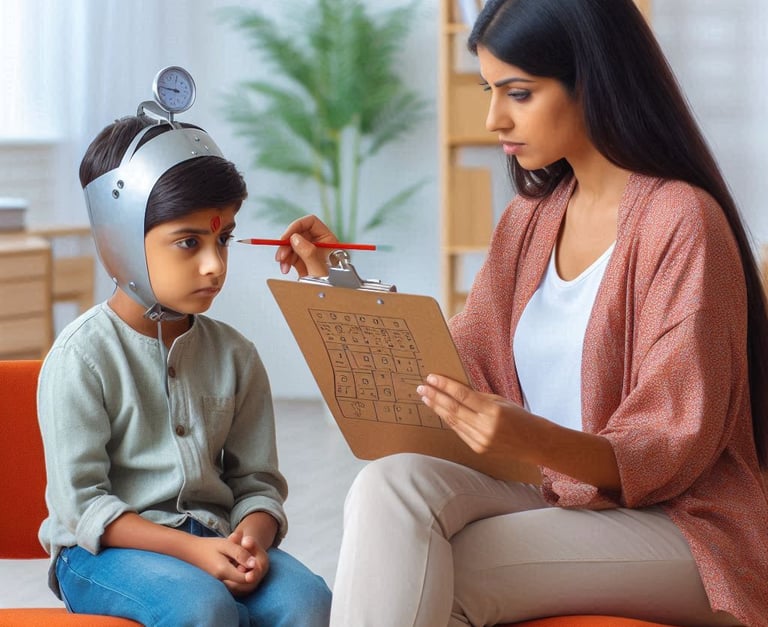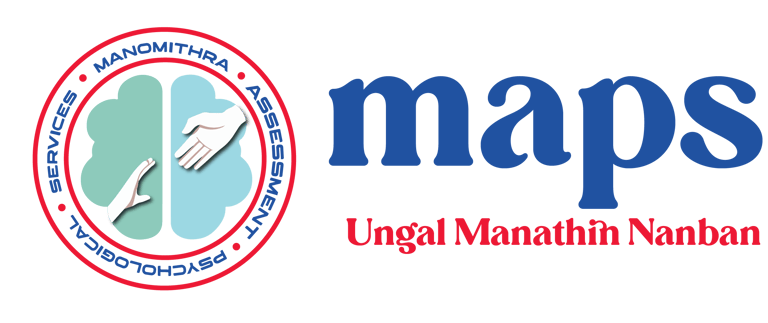Psychometric Assessments




At MAPS all the test done professionally using the following methods,
In-depth Evaluation: Clinical psychologists conduct comprehensive assessments to gain a thorough understanding of an individual's psychological makeup. These assessments delve into various domains such as cognitive abilities, personality traits, emotional functioning, and behavioral tendencies.
Test Selection: Clinical psychologists carefully select appropriate psychometric tests based on the specific concerns and needs of their clients. They may use a combination of standardized instruments, interviews, and observation to gather relevant information.
Administration and Scoring: Psychologists administer tests according to standardized protocols to ensure consistency and reliability. They meticulously score the tests to obtain accurate results, which form the basis for interpretation.
Interpretation and Analysis: Psychologists interpret assessment results within the context of the client's presenting issues and background. They analyze the data to identify patterns, strengths, challenges, and areas for intervention.
Formulation of Treatment Plans: Based on the insights gained from the assessment, clinical psychologists develop tailored treatment plans. These plans outline specific goals and interventions aimed at addressing the client's psychological needs and promoting positive outcomes.
Therapeutic Interventions: Psychometric assessment findings inform the selection of therapeutic interventions and approaches. Clinical psychologists may incorporate various evidence-based techniques such as cognitive-behavioral therapy (CBT), psychodynamic therapy, or mindfulness-based interventions to address clients' concerns effectively.
Progress Monitoring: Throughout the therapeutic process, psychologists use psychometric assessments to monitor clients' progress and evaluate the effectiveness of interventions. This ongoing assessment helps clinicians make informed decisions about treatment adjustments and modifications as needed.
Collaborative Approach: Psychometric assessment is often conducted in collaboration with the client, fostering a collaborative and transparent therapeutic relationship. Clients are actively involved in the assessment process, providing valuable input and feedback.




We at Manomithra Assessment & Psychological Services (MAPS) conduct Psychological Assessments which help us make accurate diagnosis. Based on the results of the assessment we design unique interventions according to the client’s needs and strengths so that the challenges faced can be overcome
Manomithra Assessment & Psychological Services (MAPS) conducts the following assessments,Intelligence (IQ Testing)
Intelligence quotient (IQ) test
Intelligence quotient (IQ) testing is a standardized method used by psychologists to assess an individual's cognitive abilities across various domains such as problem-solving, reasoning, memory, and verbal comprehension. Typically administered through structured tests like the Wechsler Adult Intelligence Scale (WAIS) or the Stanford-Binet Intelligence Scales, IQ tests provide a numerical score that reflects an individual's relative cognitive functioning compared to others in their age group. While IQ scores can offer insights into an individual's cognitive strengths and weaknesses, it's important to recognize that they represent only one aspect of intelligence and may not capture the full spectrum of human abilities, creativity, or emotional intelligence. Additionally, IQ testing should be interpreted cautiously and used in conjunction with other assessment measures to inform comprehensive evaluations and interventions.
Developmental assessment
Developmental assessment is a systematic process used by psychologists, educators, and healthcare professionals to evaluate a child's growth, skills, and milestones across various domains of development, including physical, cognitive, emotional, social, and behavioral. Through structured observation, standardized tests, interviews, and parent or caregiver reports, developmental assessments provide valuable insights into a child's strengths, challenges, and areas for intervention. These assessments help identify developmental delays, disabilities, or disorders, allowing for early intervention and support. Developmental assessment is essential for guiding educational planning, therapy goals, and intervention strategies to promote each child's optimal growth and well-being.
Attention-Deficit/Hyperactivity Disorder (ADD/ADHD) Assessments
Attention-Deficit/Hyperactivity Disorder (ADHD) assessments involve a comprehensive evaluation by psychologists or healthcare professionals to diagnose and understand the symptoms and impact of ADHD on an individual's functioning. These assessments typically include interviews with the individual and their family, standardized rating scales, behavioral observations, and cognitive testing to assess attention, impulsivity, and hyperactivity. Additionally, assessments may involve gathering information from teachers or other professionals who interact with the individual regularly. The goal of ADHD assessments is to accurately diagnose ADHD, rule out other potential causes of symptoms, determine the severity of impairment, and develop personalized treatment plans tailored to the individual's needs. This may include a combination of behavioral interventions, therapy, educational accommodations, and medication management. ADHD assessments are crucial for guiding appropriate interventions and support to help individuals manage their symptoms and improve their quality of life.
Learning Disabilities Assessments
Learning disabilities assessments involve a thorough evaluation by psychologists or specialists to identify specific learning difficulties and their impact on an individual's academic performance and daily functioning. These assessments typically include a combination of standardized tests, interviews, observations, and a review of academic records. Tests may assess areas such as reading, writing, math, language skills, memory, attention, and executive functioning. Additionally, assessments may involve gathering information from teachers, parents, and other professionals involved in the individual's education. The goal of learning disabilities assessments is to diagnose specific learning disorders such as dyslexia, dyscalculia, or dysgraphia, as well as to identify strengths and weaknesses in learning abilities. This information guides the development of personalized educational strategies, accommodations, and interventions to support the individual's learning needs and promote academic success. Learning disabilities assessments are essential for advocating for appropriate educational services and helping individuals reach their full potential despite learning challenges.
Giftedness assessments
Giftedness assessments are conducted by psychologists or specialists to identify individuals who demonstrate exceptional abilities or potential in specific areas such as intellectual, creative, academic, or artistic domains. These assessments typically include a combination of standardized tests, interviews, observations, and portfolio reviews to evaluate cognitive abilities, problem-solving skills, creativity, and academic achievement. Tests may assess areas such as verbal reasoning, mathematical ability, spatial reasoning, and memory. Additionally, assessments may involve gathering information from parents, teachers, and other professionals who interact with the individual regularly. The goal of giftedness assessments is to identify individuals who may benefit from advanced or specialized educational opportunities, enrichment programs, or accelerated learning pathways. By recognizing and nurturing giftedness, assessments aim to support the intellectual and socio-emotional development of these individuals and help them reach their full potential.
Personality and Psychological Assessments
Personality and psychological assessments are conducted by psychologists or mental health professionals to gain insights into an individual's personality traits, emotional functioning, cognitive patterns, and overall psychological well-being. These assessments typically involve a combination of standardized tests, self-report questionnaires, interviews, and behavioral observations. Tests may assess personality dimensions, such as the Big Five traits (openness, conscientiousness, extraversion, agreeableness, and neuroticism), as well as emotional intelligence, attachment styles, and coping strategies. Additionally, assessments may explore specific psychological concerns such as anxiety, depression, trauma, or personality disorders. The goal of personality and psychological assessments is to provide a comprehensive understanding of an individual's psychological profile, inform diagnosis and treatment planning, and support personal growth, self-awareness, and mental health. These assessments are used in various settings, including clinical practice, counseling, research, and organizational psychology, to promote well-being and facilitate positive outcomes.
Neuropsychological Assessments
Neuropsychological assessments are comprehensive evaluations conducted by neuropsychologists to assess cognitive functioning, brain-behavior relationships, and neurological conditions. These assessments involve a battery of standardized tests and measures to evaluate various cognitive domains such as attention, memory, language, executive functioning, visuospatial abilities, and motor skills. Additionally, assessments may include tests of emotional and behavioral functioning. Neuropsychologists analyze the results of these tests to identify strengths and weaknesses in cognitive abilities and detect any signs of neurological dysfunction or impairment. Neuropsychological assessments are used to diagnose and monitor conditions such as traumatic brain injury, stroke, dementia, epilepsy, ADHD, learning disabilities, and neurodevelopmental disorders. The information gathered from these assessments helps inform treatment planning, rehabilitation strategies, academic accommodations, and interventions to optimize cognitive functioning and quality of life for individuals with neurological conditions.
